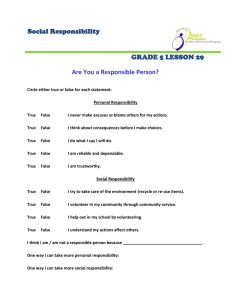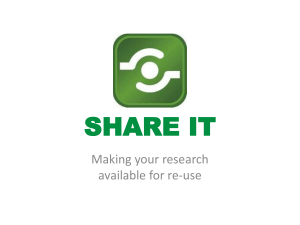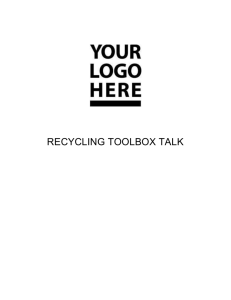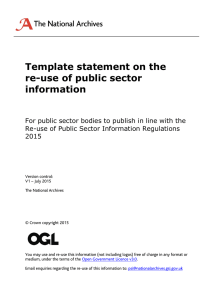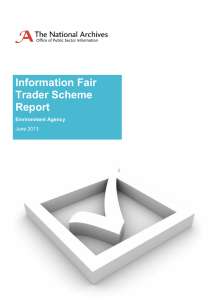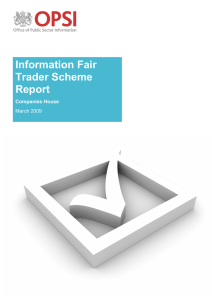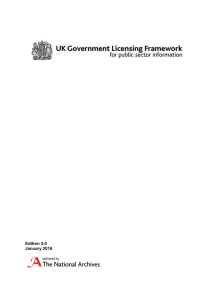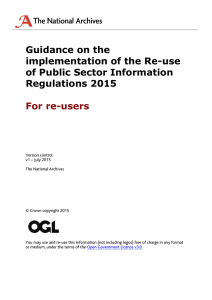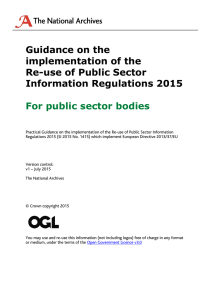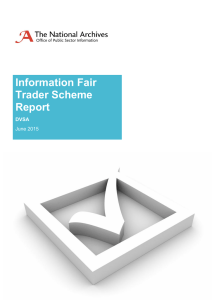Glossary of public sector information and re-use terms
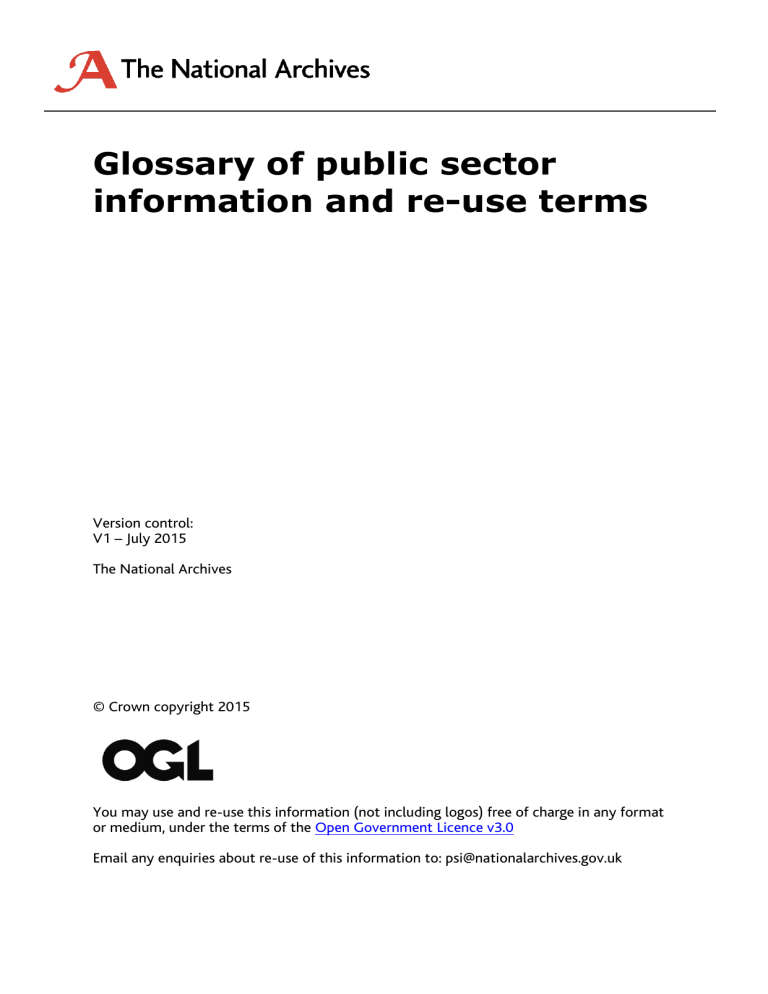
Glossary of public sector information and re-use terms
Version control:
V1 – July 2015
The National Archives
© Crown copyright 2015
You may use and re-use this information (not including logos) free of charge in any format or medium, under the terms of the Open Government Licence v3.0
Email any enquiries about re-use of this information to: psi@nationalarchives.gov.uk
Glossary of public sector information and re-use terms
Visit the Glossary of Public Sector Information and Open Data Terminology and the UK
Licensing Framework overview for additional definitions.
Access legislation – a suite of legislation that enables public access to information produced or collected by public sector bodies, including the Freedom of Information Act and
Environmental Information Regulations
Accessible – the ability to obtain public sector information, whether by request or by harvesting information already provided
Amending Directive – means the EU Directive on the Re-use of Public Sector Information
2013
Copyright – the right of a creator to protect material such as literary works, artistic works, software and databases, and which stops others from using such material without permission
Cost – the cost of collection, production, reproduction and dissemination of public sector information
Crown copyright – copyright in information created for the Crown by servants of the
Crown (e.g., civil servants and ministers of the Crown) in the course of their duties. It includes legislation, government codes of practice, government reports, official press releases, government forms and many public records as well as specialist information
Cultural sector – public sector bodies that are libraries (including university libraries), museums (including galleries) and archives
Data – a subset of information: raw, unorganised facts that need to be processed. Data is processed, organised, structured or presented in a given context to make it useful
Directive – means the EU Directive on the Re-use of Public Sector Information 2003
Document – any information produced by a public sector body whatever its format: written on paper or stored in electronic format or as an audio, visual or audio visual recording; includes artefacts but excludes computer programs. Also see the definition of ‘Information’
Excluded – public task information held by public sector bodies may be that is excluded from the 2015 Regulations for a number of reasons: (a) it has third-party copyright,
(b) access to the information is excluded or restricted under information access legislation
(c) the information is held by a public sector broadcaster, an educational or research establishment or a cultural establishment (other than a library, museum or archive), or (d) a person is obliged to prove an interest in the information in order to gain access to it. Parts of documents containing only logos, crests or insignia are also excluded
Glossary of public sector information and re-use terms – July 2015 Page 2
First-Tier tribunal – the General Regulatory Chamber of the First-Tier Tribunal, information rights jurisdiction
Formal open standard – a standard which details specifications for the requirements on how to ensure software interoperability. A technical open standard is a standard that is publicly available and has various rights to use associated with it, and may also have various properties of how it was designed (e.g., open process). There is no single definition and interpretations vary with usage
Gallery – for the purposes of the 2015 Regulations, a gallery is considered a type of museum
Information –information includes documents, web and other online content, digital and paper records, objects and data produced, collected, held or disseminated within a public sector body’s public task. Also see the definition of ‘Document’
Information asset – information that is defined and managed as a single unit so it can be understood, shared, protected and exploited effectively. Examples include a database of contacts, files related to a project (documents, spreadsheets, images), financial data, information about what a public sector body does
Information asset list – a list of a public sector body’s information assets, usually categorised by a standard classification method
Intellectual property rights – a set of property rights which protects uniquely created materials, and includes copyright and database rights, trade marks, patents, and designs
Interoperable – in licensing, this means compatible. In software, this means making systems and organisations work together (inter-operate)
Machine-readable format – a file format structured so that software applications can easily identify, recognise and extract specific data, including individual statements of fact, and their internal structure. Information is in a standard computer language (not English text) that can be read automatically by a web browser or computer system (e.g., XML or CSV)
Machine-readable licence – a licence that is readable by machine, for example in data file formats intended principally for machines such as RDF , XML , or JSON.
The Open
Government Licence is an example
Marginal cost – limited to the cost of collection, production, reproduction, provision and dissemination of information (which for digital or online information may be nil) for most public sector bodies. The EC has produced Guidelines on recommended standard licences, datasets and charging for the reuse of documents
Metadata – information that describes or defines other information. Metadata includes file descriptions, codebooks, processing details, sample designs, etc
Open data – data which can be freely used, re-used and redistributed by anyone. It usually requires only attribution and/or a sharealike (re-users mixing open data with other data must release the results as open data). Public sector information and its metadata should available in open format whenever possible
Glossary of public sector information and re-use terms – July 2015 Page 3
Open format – a file format that is platform-independent and made available to the public without restrictions that could hinder the re-use of information
Open licence – an open licence is non-restrictive and does not require registration. The
Open Government Licence is an example. The EC has produced Guidelines on recommended standard licences, datasets and charging for the reuse of documents
Personal data – information about living individuals, including factual information (such as name, date of birth, address and occupation) and opinions (in any format) which might lead to the identification of the individual. In relation to public sector information, databases and archival records are likely to contain personal information. Re-use of such information must comply with the Data Protection Act 1998
Public domain – intellectual property rights in which the copyright or patent has expired or is not applicable
Public records – includes not only written records but records conveying information by any other means whatsoever (as defined in the Public Records Act (PRA)):
any information records already in the Public Record Office at the time of the 1958
Act
administrative and departmental records belonging to Her Majesty, in the UK or elsewhere, in right of Her Majesty’s Government, and in particular records of, or held in, any government department and records of offices, commissions or other bodies under HMG in the UK
records of courts and tribunals
records of other bodies if their own legislation brings them within the PRA or they have been brought within its scope in some other way, e.g., the British Council
Public sector body – Regulation 3 has a list of public sector bodies. They include central and local government, public corporations, and bodies governed by public law (and associations formed by such authorities).
central government: includes government departments and their executive agencies, non-departmental public bodies, and any other non-market bodies controlled and mainly financed by them
local government: those types of public administration that only cover a specific locality and any non-market bodies controlled and mainly financed by them
public corporations: market bodies controlled by either central or local government.
These can include government-owned companies and information traders
Public sector information – information collected, held, produced, reproduced or disseminated by a public sector body while accomplishing its public task. Also see the definitions of ‘Information’ and ‘Document’
Public task – what a public sector body does, or produces, holds, collects or provides to fulfil its core role and functions, whether those are statutory or established through custom and practice
Glossary of public sector information and re-use terms – July 2015 Page 4
Publicly funded – means that a public sector body receives all or most (at least 50%) of its regular income from a local or central government authority or another public body
Publish –to disseminate information produced, collected or held by a public sector body, by publishing the material itself or through a third party, in print or in digital format
Re-use – using information for a purpose other than the initial public task purpose for which the public sector body produced, collected, held or disseminated the information. Re-use can be for either commercial or non-commercial purposes
Standard licence – although not defined in the Amending Directive or the 2015
Regulations, a standard licence is the default licence for public sector bodies. It should be as open and non-restrictive as possible, and it must be available in digital format and processed electronically. The EC has produced Guidelines on recommended standard licences, datasets and charging for the reuse of documents
University – any public sector body that provides post-secondary-school higher education leading to academic degrees
University library – taken to mean a library attached to a higher education body. It refers not only the library itself, but can also refer to the parts of a university with library collections management functions, and to the information service that controls and disseminates information from within the higher education parent body
Glossary of public sector information and re-use terms – July 2015 Page 5
